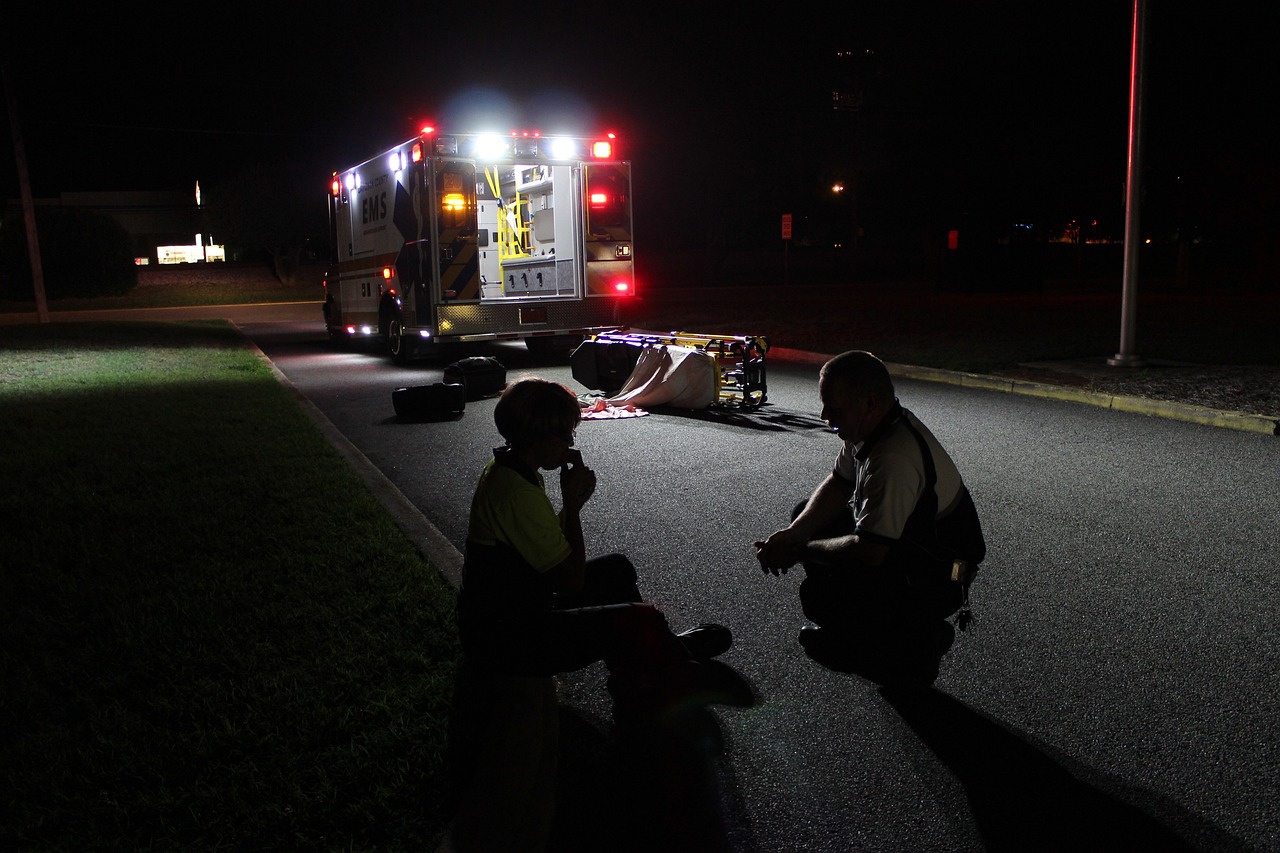
Every siren that blares, every flashing light that illuminates the night, and every desperate call for help resonates with the hearts of our brave first responders. In a world filled with uncertainty and danger, they are the unwavering guardians of our safety, rushing toward chaos while everyone else seeks safety. Yet, beneath their courageous exteriors, lie hidden battles that often remain unspoken and unacknowledged—the relentless and haunting trauma of post-traumatic stress disorder (PTSD).
It is high time we confront the stigma surrounding first responders' mental health and actively seek avenues for their healing. This is not just a call to action; it is a plea for understanding and empathy.
When we think of first responders, we envision the heroes in uniforms—paramedics, firefighters, police officers—individuals who charge into life-threatening situations with unwavering determination to protect and serve. They are the pillars of strength, the beacons of hope, and the embodiment of courage. Their acts of selflessness inspire awe and gratitude, and rightfully so. However, behind the scenes, many first responders endure an emotional toll that is often invisible to the world.
Traumatic incidents are an inevitable part of a first responder's reality. They stand witness to unimaginable horrors, ranging from devastating accidents to heinous crimes.
Such experiences leave indelible marks on the psyche, leading to PTSD—a condition that affects countless brave souls. PTSD is not a sign of weakness; it is a human response to inhumane situations.
Imagine being a paramedic, answering distress calls day after day, tending to the injured, and grappling with life-or-death decisions. Or envision being a firefighter, rushing into a burning building to rescue those trapped inside, all while confronting the ever-present danger of losing a comrade or suffering severe injuries.The weight of these experiences can become unbearable, but societal expectations often pressure first responders to bear their burdens silently.
Unfortunately, a pervasive stigma clouds the world of first responders and mental health. Many feel they cannot openly discuss their struggles without facing judgment or repercussions. Fear of being labeled as weak or unfit for the job forces them into silence, where the wounds of trauma fester in isolation.
This stigma is not only damaging to the individuals who suffer but also to the entire first responder community. Suppressing emotions and avoiding seeking help only perpetuate the cycle of suffering. It is high time we dismantle the barriers to mental health support, recognizing that acknowledging trauma and seeking help are acts of courage, not weakness.
Breaking the stigma surrounding first responders' mental health requires a multi-faceted approach. It is incumbent upon all of us, as a society, to cultivate a culture of empathy and understanding for those who dedicate their lives to our safety.
Organizations employing first responders must prioritize mental health support by offering comprehensive training on recognizing and addressing PTSD. This training should teach supervisors and colleagues how to identify signs of distress in their peers and provide guidance on approaching the subject delicately and compassionately.
Mental health resources should be readily available, confidential, and easily accessible. These resources can include counseling services, peer support programs, and helplines staffed by mental health professionals who are well-versed in the unique challenges faced by first responders.
Creating an environment where first responders feel safe to discuss their emotions without fear of judgment is crucial. Establishing regular support group sessions, facilitated by mental health experts, can offer a space for open dialogue, where they can share their experiences and coping mechanisms.
Moreover, promoting a culture that celebrates vulnerability and emotional honesty will empower first responders to reach out for help when needed. Honest conversations can break down the barriers of shame and isolation, fostering a sense of unity among those who often feel alone in their struggles.
Just as physical fitness is a fundamental aspect of first responder training, so too should mental fitness be integrated into the curriculum. By teaching coping strategies and resilience-building techniques during training, we equip these brave individuals with the tools they need to navigate the aftermath of traumatic incidents.
Additionally, by educating them about the signs of PTSD and the importance of seeking timely help, we instill the understanding that mental health is as essential as physical health.
Advocacy at a systemic level is crucial in addressing the mental health needs of first responders. Policymakers should work closely with mental health experts and first responder communities to develop comprehensive policies that prioritize mental well-being.
These policies should include measures to reduce the stigma surrounding mental health, as well as provisions for mental health assessments, mandatory debriefings after traumatic incidents, and adequate time off for recovery and self-care.
Moreover, insurance providers must be encouraged to offer comprehensive coverage for mental health services, ensuring that cost is not a barrier to accessing the necessary support.
Raising public awareness about the challenges faced by first responders and the importance of mental health is crucial. Public perception plays a significant role in shaping societal attitudes. By shedding light on the emotional toll of the job and the need for compassion, we can challenge stereotypes and dispel misconceptions about mental health.
Public awareness campaigns can also help humanize first responders, showcasing their vulnerabilities and strengths, thus fostering empathy and understanding among the general public.
Within the first responder community, it is vital to celebrate acts of self-care. Encouraging colleagues to take time off when needed, promoting hobbies and activities that promote relaxation, and recognizing individuals who seek help for mental health issues are all crucial steps in creating a supportive environment.By showcasing that self-care is not a sign of weakness but an essential part of maintaining mental well-being, we empower first responders to prioritize their emotional health.
Breaking the stigma is only the first step; the journey to healing is a challenging one that requires collective effort and ongoing support. For first responders grappling with PTSD, seeking healing may feel like a daunting task, but it is a journey well worth embarking upon.
The cornerstone of healing from PTSD is seeking professional counseling and therapy. Mental health professionals experienced in trauma-related disorders can provide tailored treatment, guiding first responders through the process of addressing their experiences and developing coping strategies.
Through techniques such as Cognitive Behavioral Therapy (CBT), Eye Movement Desensitization and Reprocessing (EMDR), and group therapy, individuals can process their trauma, reframe negative thought patterns, and learn to manage stress and triggers effectively.
Seeking professional counseling or therapy is a vital step in processing grief. Counseling can offer first responders a confidential environment to express their emotions and receive guidance from experts trained in trauma and loss.
Mindfulness and meditation practices have shown promise in reducing stress and improving mental well-being. Encouraging first responders to incorporate these practices into their daily lives can help them develop resilience and find moments of calm amidst the chaos.
Mindfulness exercises can also assist in grounding individuals during periods of distress, enabling them to regain control of their emotions and thoughts.
Physical activity is a powerful tool in promoting mental health. Encouraging first responders to engage in regular exercise, whether it be through team sports, yoga, or running, can release endorphins and reduce symptoms of anxiety and depression.
Exercise not only improves physical health but also enhances mood and self-esteem, contributing to a holistic approach to healing.
Building and maintaining meaningful relationships with loved ones is essential for the healing process. Encouraging open communication with family and friends can provide a strong support system during challenging times.
Moreover, fostering a work environment that prioritizes camaraderie and emotional support among colleagues strengthens the bonds within the first responder community.
The courage and dedication exhibited by first responders deserve our utmost respect and gratitude. They are the heroes among us, selflessly putting their lives on the line to protect ours. But let us remember that these heroes are also human—vulnerable to the wounds of trauma and in need of healing and support.Breaking the stigma surrounding first responders' mental health is not just a call to action; it is a collective responsibility. We must create an environment where seeking help is not seen as a weakness but as an act of courage and strength.
As a society, let us honor these heroes by acknowledging their struggles and providing them with the resources and support they need to heal. By doing so, we show that we truly value and respect the sacrifices they make for us every day.
Together, we can rewrite the narrative surrounding first responders and PTSD, fostering a culture of empathy and healing. Only then can we ensure that those who serve as our first line of defense also receive the care and compassion they deserve—the care that will allow them to continue their vital work with renewed strength and resilience.
Let us break the chains of stigma and pave the way to healing.
 Made with Flowtrack
Made with Flowtrack